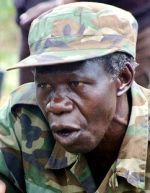Top Uganda rebel at neutral camp – Sudanese mediator
Sept 11, 2006 (JUBA) — A top Ugandan rebel leader has arrived at a neutral camp in southern Sudan as part of a truce to end 19 years of brutal conflict with the government, the chief mediator said Monday.
 Lord’s Resistance Army deputy Vincent Otti, who is wanted by the International Criminal Court for war crimes, showed up at Ri kwangba camp, just 550 yards (500 meters) north of the border with the Democratic Republic of Congo, said southern Sudan’s vice president, Riek Machar.
Lord’s Resistance Army deputy Vincent Otti, who is wanted by the International Criminal Court for war crimes, showed up at Ri kwangba camp, just 550 yards (500 meters) north of the border with the Democratic Republic of Congo, said southern Sudan’s vice president, Riek Machar.
Behind him is the infamous leader of the rebel group, Joseph Kony, said Machar, who is mediating the ongoing peace talks between the rebels and Ugandan government.
The rebels, notorious for cutting off the tongues and lips of innocent civilians during the insurgency, signed a truce with the government last month.
The deal calls for rebel fighters to gather in largely uninhabited areas across the border in southern Sudan, where they will be protected while a broader peace deal is negotiated.
If both sides reach a comprehensive deal, it will be a major breakthrough in pacifying the African region that joins northern Uganda, eastern Congo and southern Sudan.
Rebels from all three nations operated across the borders with impunity for decades until a peace accord halted Congo’s civil war in 2003 and southern Sudanese rebels joined Sudan’s government in 2005.
Machar said around 400 Lord’s Resistance Army rebels had shown up at one camp, Owiny-Ki-Bul, in southern Sudan and just north of the Ugandan border. It is one of two assembly points where the rebels should gather under the truce signed with the Ugandan government.
More rebels have gathered at Ri kwangba, Machar added, although he was unable to give specific numbers.
“Vincent [Otti] is definitely there and just behind the lines is Joseph [Kony] himself,” he told journalists at the southern Sudan capital, Juba, where the peace talks are taking place.
Kony also is wanted by the Hague-based criminal court for his part in the two decades-long conflict, which has terrorized the region.
The rebels have walked to both sites since the cessation of hostilities was signed last month.
The announcement came as U.N. humanitarian chief Jan Egeland, who is in Juba to hold talks with both sides, promised the United Nations would provide support at the two sites where the rebel fighters are gathering.
“We hope the peace talks will lead to a durable peaceful solution, and we will do our utmost in helping that,” Egeland told reporters after meeting with Machar.
Egeland also said the United Nations would step in to help women and children who are released by the Lord’s Resistance Army.
REBELS WILLING TO RELEASE WOMEN, CHILDREN
Earlier Monday, the rebels said they were willing to release women and children who have been seized during the conflict.
“The sick and all women and children who are in the bush can be released, but the modalities need to be worked out,” said Martin Ojul, the head of the rebels’ negotiating team in Juba. “We need to work out who will take care of them and where they will be taken.”
U.N. officials estimate the rebels have kidnapped some 20,000 children over the past two decades, turning the boys into soldiers and the girls into sex slaves for rebel commanders.
Ojul said the rebel group had held no captives, and that those they would release were the wives and children of its fighters.
He could give no details on the numbers to be released.
The Lord’s Resistance Army was formed from the remnants of a northern Uganda rebellion that began in 1986 after President Yoweri Museveni, a southerner, overthrew a brutal military junta.
Kony mixed northern politics with religious mysticism, declaring himself a Christian prophet fighting to rule this country of 26 million people by the Ten Commandments.
The International Criminal Court has issued arrest warrants for Kony and four other rebel leaders, but the government has promised not to turn them over in return for an end to the insurgency.
Human rights groups have condemned Museveni’s amnesty offer, but the president argues peace is more important than an international trial.
(AP/ST)
